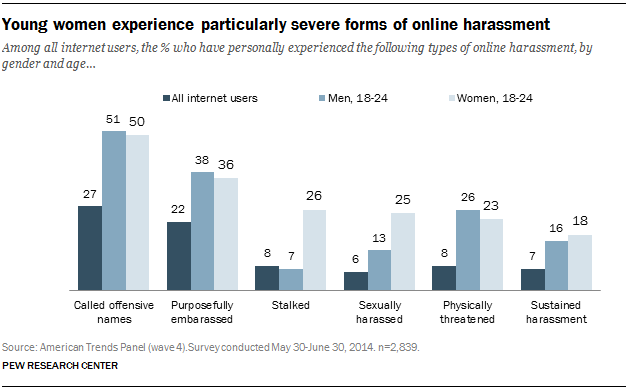
Four out of 10 adults have experienced some form of online harassment, but some of the most alarming variants — stalking and sexual harassment — disproportionately affect upon young women, according to a Pew survey released Wednesday.
The survey breaks down online harassment into six categories, from name calling and humiliation to physical and sexual threats. The milder attacks crossed gender lines and occurred so pervasively that many respondents said they chose to ignore their attacker rather than engage or withdraw from the forum.
But beneath the white noise of insults, experiences varied dramatically depending on the respondents’ age and gender. Roughly one-quarter of women aged 18 to 24 said they have been stalked or sexually harassed online, making them visible stand-outs from an otherwise level field of insults.

The Pew survey also exposes deeper divides that can exact a greater emotional toll on Internet users. “Those who exclusively experience less severe forms of harassment report fewer emotional or personal impacts,” the study authors write, “while those with more severe harassment experiences often report more serious emotional tolls.” It lends empirical weight to the argument that there’s no comparing male and female harassment online.
More Must-Reads from TIME
- Donald Trump Is TIME's 2024 Person of the Year
- Why We Chose Trump as Person of the Year
- Is Intermittent Fasting Good or Bad for You?
- The 100 Must-Read Books of 2024
- The 20 Best Christmas TV Episodes
- Column: If Optimism Feels Ridiculous Now, Try Hope
- The Future of Climate Action Is Trade Policy
- Merle Bombardieri Is Helping People Make the Baby Decision
Contact us at letters@time.com